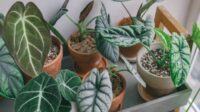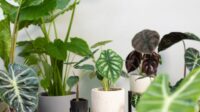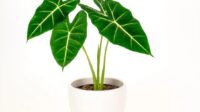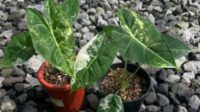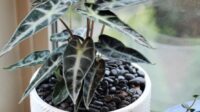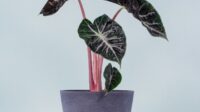
Having the right soil mix is essential for non-soil components of Alocasia plants. Zamioculcas zamiifolia (ZZ Plant or Emerald Plant) Alocasia grows best in a drainless but hydrous environment, similar to what it would be growing in if you could remove the pot and take the whole plant into a tropical rainforest. An ideal Alocasia soil blend encourages root growth along with optimum moisture retention which is supplemented by nutrients. In this guide, we will use an easy and straightforward recipe that yields the perfect soil mix for your Alocasia to ensure you keep your plant healthy (and lovely).
1. Importance of Soil Mix for Alocasia
The soil is much more than dirt; it is an essential ecosystem for root system health. Common issues like root rot and nutrient deficiency arises as a result of not having the required balance of drainage, aeration and water retention in alocasia.
2. What To Include In Your Alocasia Soil Mix
Ideal Alocasia potting mix includes:
- Potting soil as a base for nutrition.
- Orchid bark for aeration.
- Perlite for drainage.
- Use of coconut fiber to retain moisture.
- Additives such as charcoal, worm castings you know the drill.
3. Base Potting Soil
It all begins with a rich and healthy potting soil. Find one that is light, full of nutrients, and does not contain heavy clays which hold too much water.
4. Perlite A Soil Amendment That Helps With Drainage
Perlite is a lightweight, porous material that allows for the water and soil to not collect in piles after watering. Necessary to prevent root rot and enhance drying of soil.
5. Coconut Coir for Maintaining Moisture
Peat moss has great substitutes like coconut coir. It binds moisture but drains efficiently, maintaining the right level of moisture around Alocasia roots.
6. Aeration with Orchid Bark
Orchid bark helps in the structure of the soil and keeps the roots oxygenated. It is very important for Alocasia, as they prefer well-aerated soil.
7. Enhancing Nutrition Through Worm Castings
This naturally boosts the nutrient levels in the soil which in turn encourages healthy plant development and resistance to diseases.
8. Root Expert Activated Charcoal
The activated charcoal acts as a natural detox, filtering out harmful toxins and reducing fungal infections in the root zone of your plant to create a healthy space for your plants.
9. Alocasia preferably likes their soil to be a little moist all the time, therefore damp 50% of the time.
In your cart, and balance the following for optimal muddle:
- 40% potting soil
- 20% orchid bark
- 20% perlite
- 20% coconut coir
- 1-2 handfuls worm castings (optional) and a pinch of activated charcoal (optional)
10. Mixing the Ingredients
Stir to combine well until the mixture is very evenly mixed. To check the texture: squeeze it in your hand, it should hold its shape lightly but crumble when poked.
11. Once you have prepared your new soil mix, the next method for cutting down their watering frequency would be to repotting your Alocasia with it.
Carefully take your Alocasia out of its pot, check the roots for any rot and cut off as necessary. Put the soil mixture in a planter with holes on the bottom and place your plant in it.
12. Watering and Testing Drainage
If you have repotted your Alocasia, drench them and watch the excess. The water must flow out easily without pooling above (signifying that the ground is not draining properly).
13. Keeping the Soil Mix in Good Condition Over Time
Soils can lose their structure and be compacted over time. Aim to repot your Alocasia every 1-2 years to get a fresh mix for the best growing environment.
14. Tweaking the Recipe For Your Environment
Adjust the recipe according to where you live, especially if you live in a very humid or dry area. If you live in a humid area, increase perlite for enhanced drainage. Add more coconut coir if you live in area that has less humidity.
15. 5 Common Soil Problems and How to Fix Them
Surface water pooling: Add more perlite or orchid bark to increase drainage.
Soil Drying Quickly: Add More Coconut Coir.
Bad smell or Mold: Change of soil mix and make sure that the pot is not clogged.
So you can see, when you create the perfect soil mix for your Alocasia, this kind of gives them a head start to be healthy and live its best life! Grow it well and this recipe plays out right in your look of an Alocasia with dramatic foliage & space-filling growth.Wiling is actually a stress symptom that usually occurs because of wrong watering, low humidity or unfavorable growing environment. This guide will enable you to pinpoint the cause of the problem and give you practical solutions to get your plant back on track. These are simple solutions that will help your Alocasia Polly thrive whether you are a new owner or an experienced house plant enthusiast.This guide will cover the best Alocasia fertilizers to use, how and when to fertilize for the most growth. If you’re really ready to step up your Alocasia care game this article will give you all the deets you need on how to feed your plant so that it stays healthy and happy.

